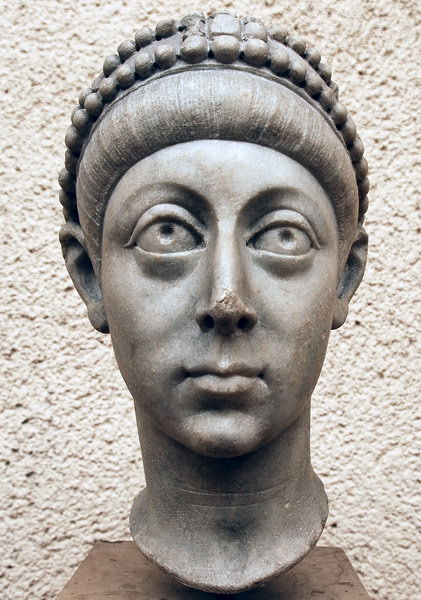Synesius, On Imperial Rule 12
 In his speech On Imperial Rule (or On Monarchy), Synesius of Cyrene offers some advise to the emperor Arcadius (r.395-408). More information about this speech, together with a brief summary, can be found here.
In his speech On Imperial Rule (or On Monarchy), Synesius of Cyrene offers some advise to the emperor Arcadius (r.395-408). More information about this speech, together with a brief summary, can be found here.
Throughout this speech, the word "Scythians" refers to the Tervingian Germans (who would later be known as Visigoths), whereas "king" refers to emperor.
The text is offered here in the translation by A. Fitzgerald. The four-digit numbers are page numbers of the Migne edition.
On Imperial Rule 12
[1] [1081] But if, just as this discourse has long dallied over the decoration of your lives, it were also to reserve some little space for the life of kings in the past, whether we call it rusticity, or, if you prefer it, simplicity, in that case prodigality and frugality would fittingly be contrasted with one another; and once you had seen these in their naked reality, you would be enamored of the true beauty of a king, dismissing that which is merely outward appearance and sham.
[2] The one destiny we described in terms of material things for the most part, the other it is not possible to describe in these, and we must obtain it from other sources. Excess of worldly goods does not belong to the second of these lives because it is not striving for them. It would rather be represented by its habits. And yet work advances at once along with the progress of lives that are in confirmity with the law of nature.
[3] It is therefore worthwhile to make mention of the character and achievements of a certain king, for any particular story will suffice to draw all others along in its wake. It is told of one of no great antiquity but such an one as even the grandfathers of our own elders might have known if only they had not begotten their children when young, and not become grandparents during the youth of their own children.
[4] It is said, then, that a certain monarch of those days was leading an expedition against the Parthians,note who had behaved towards the Romans in an insulting manner. Now when they had reached the mountain frontiers of Armenia, before entering the enemy country, he was eager to dine, and gave orders to the army to make use of the provisions in the supply column, as they were now in a position to live off the neighboring country should it be necessary. He was then pointing out to them the land of the Parthians. Now, while they were so engaged, an embassy appeared from the enemy lines, thinking on their arrival to have the first conversation with the influential men who surrounded the king, and after these with some dependants and gentleman ushers, but supposing that only on a much later day would the king himself give audience to the embassy.
[5] [1084] However, it turned out somehow that the king was dining at the moment. Such a thing did not exist at that time as the Guards' regiment, a sort of picked force detached from the army itself, of men all young, tall, fair-haired and superb, "their heads ever anointed and their faces fair,"note equipped with golden shields and golden lances. At the sight of these we are made aware beforehand of the king's approach, much as, I imagine, we recognize the sun by the rays that rise above the horizon. Here, in contrast, every phalanx doing its duty, was the guard of the king and kingdom. And these kings held themselves in simple fashion, for they were kings not in pomp but in spirit, and it was only within that they differed from other people. Externally they appeared in the likeness of the herd, and it was in such guise, they say, that Carinus was seen by the embassy. A tunic dyed in purple was lying on the grass, and for repast he had a soup of yesterday's peas, and in some bits of salted pork that had grown old in the service.
[6] Now when he saw them, according to the story, he did not spring up, nor did he change anything; but called out to these men from the very spot and said that he knew that they had come to see him, for that he was Carinus; and he bade them tell the young king [Bahram II] that very day, that unless he conducted himself wisely, he might expect that the whole of their forest and plain would be in a single month barer than the head of Carinus.note And as he spoke, they say that he took off his cap and showed his head, which was no more hairy than the helmet lying at his side. And he gave them leave if they were hungry to attack the stew-pot with him, but if not in need, he ordered them to depart at once, and to leave the Roman lines, as their mission was at an end.
[7] Now it is said that when these messages were reported to the rank and file and to the leader of the enemy, namely all that had been seen and heard, at once -as might have been expected- shuddering and fear fell upon everyone at the thought of fighting men such as these, whose very king was neither ashamed of being king [1085] nor of being bald, and who, offering them a stew-pot, invited them to share his meal. And their braggart king arrived in a state of terror and was ready to yield in everything, he of the tiara and robes, to one in a simple woolen tunic and cap.